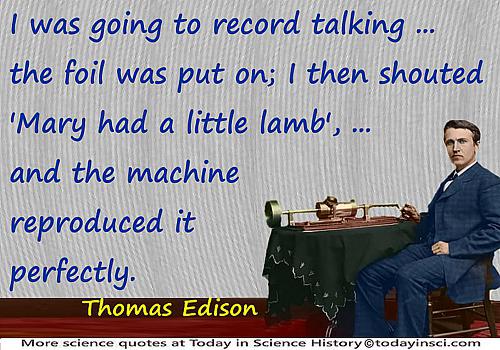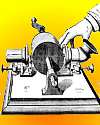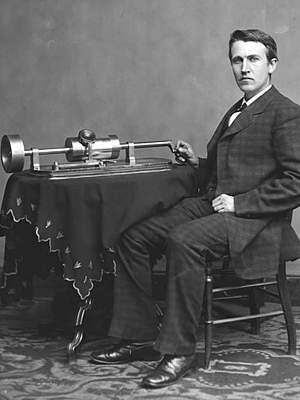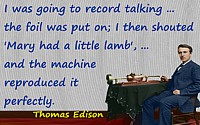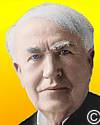 (source)
(source)
|
Thomas Edison
(11 Feb 1847 - 18 Oct 1931)
American inventor who was known internationally as “the Wizard of Menlo Park,” for the huge number of innovations coming from there, the world's first industrial research laboratory.
|
Thomas Edison Quote - Tinfoil Phonograph
“Mary Had a Little Lamb”
Illustrated Quote - Medium (500 x 350 px)
More Thomas Edison quotes >>
Edison Valued His First Tinfoil Phonograph at $18
The condensed quote above comes from a longer description of his tin foil phonograph that Thomas Edison gave in his own account:
The workman who got the sketch was John Kruesi. I didn't have much faith that it would work, expecting that I might possibly hear a word or so that would give hope of a future for the idea. Kruesi, when he had nearly finished it, asked what it was for. I told him I was going to record talking, and then have the machine talk back. He thought it absurd. However, it was finished, the foil was put on; I then shouted ‘Mary had a little lamb,’ etc. I adjusted the reproducer, and the machine reproduced it perfectly. I was never so taken aback in my life. Everybody was astonished. I was always afraid of things that worked the first time. Long experience proved that there were great drawbacks found generally before they could be got commercial; but here was something there was no doubt of."1
It is said that Carman, the foreman of the machine shop, had gone the length of wagering Edison a box of cigars that the device would not work. All the world knows that he lost.1
Edison had given his first plans to Kruesi in Dec 1877. In the posed photo, shown here, Edison was sitting with an improved machine. Note that in this photo, probably taken in 1878, Edison would have be about 30 years old. We are more familiar from the documentary movies seeing him as a much older man, but this photo instead shows him in his prime years.
This, his first major invention brought Edison international attention. Then, in 1879, just two years after drawing his phonograph plans, Edison was demonstrating his successful light bulb design.
More Thomas Edison quotes >>
- Science Quotes by Thomas Edison.
- 11 Feb - short biography, births, deaths and events on date of Edison's birth.
- First Thomas Edison Lamp Factory - from Edisonia (1904)
- Thomas Edison Quote “Mary Had A Little Lamb” - Illustrated quote with Tinfoil Phonograph - Large 800 x 600px
- The Talking Phonograph - Thomas Edison's invention of his tinfoil phonograph - article in Scientific American (22 Dec 1877) - with illustrated quote, medium 500px.
- Thomas Edison Quote “Something there was no doubt of” - Illustrated quote + tinfoil phonograph engraving 800px
- Thomas Edison - context of quote “Genius is not inspired. Inspiration is perspiration.” - Medium image (500 x 350 px)
- Thomas Edison - context of quote “Genius is not inspired. Inspiration is perspiration.” - Large image (800 x 600 px)
- Thomas Edison Quote “Something there was no doubt of” - Illustrated quote + tinfoil phonograph engraving 500px
- Edison Fears Hidden Perils of the X-Rays - from New York World (3 Aug 1903).
- 1 Oct - short biography, births, deaths and events on date of opening of Edison's Menlo Park lamp factory.
- Edison: A Biography, by Matthew Josephson. - book suggestion.
- Booklist for Thomas Edison.
